- Home
- Roxane Gay
The Best American Short Stories 2018 Page 11
The Best American Short Stories 2018 Read online
Page 11
Alice put the bag on the console between herself and the man. He looked at the bag from the corner of his eye, a look that was maybe purposefully restrained, like he was proving he didn’t care too much about its contents. No matter that he had found himself in a parking lot in the unforgiving clarity of midafternoon to buy someone’s underwear.
The man took the bag but didn’t, as she feared, open it in front of her. He tucked it in the pocket of his side door. When he turned back to her, she sensed his disgust—not for himself, but for her. She no longer served a purpose, and every moment she stayed in the car was just another moment that reminded him of his own weakness. It occurred to her that he might do some harm to her. Even here. She looked out the windshield at the cars beyond, the trees. It would be dinnertime at her mother’s house. Her mother steaming rice in a bag and putting out placemats that easily wiped clean. Asking Henry if he had a good movie in mind for after dinner. Henry loved documentaries about Hitler or particularly exotic animals. It suddenly seemed nice to load the dishwasher and wish for small things.
“Can I have the money?” she said, her voice going too high.
A look of pain fleeted across his face. He took out his wallet with great effort.
“We said sixty?”
“Seventy-five,” she said, “that’s what you said in the email. Seventy-five.”
His hesitation allowed her to hate him, fully, to watch with cold eyes as he counted out the bills. Why hadn’t he done this ahead of time? He probably wanted her to witness this, Mark or Brian or whoever he was, believing that he was shaming or punishing her by prolonging the encounter, making sure she fully experienced the transaction, bill by bill. When he had seventy-five dollars, he held the money in her direction, just out of reach so Alice had to make an effort to grab for it. He smiled, like she had confirmed something.
When she told Oona the story on Saturday, Alice would leave this part out: how, when she tried to open the car door, the door was locked.
How the man said, “Whoops,” his voice swerving high, “whoops-a-daisy.” He went to press the unlock button, but Alice was still grabbing at the door handle, frantic, her heart clanging in her chest.
“Relax,” he said. “Stop pulling or it won’t unlock.”
Alice was certain, suddenly, that she was trapped, that great violence was coming to her. Who would feel bad for her? She had done this to herself.
“Just stop,” the man said. “You’re only making it worse.”
Alicia Elliott
Unearth
from Grain
They found him while laying the groundwork for a fast food restaurant. She forgot the name as soon as the officer said it—not McDonald’s, not Wendy’s. No, it was something new, something flashy and fleeting. Whatever it was, the thought made her sick. She couldn’t shake the image of a child’s tooth being pounded into beef patties, or tiny brown limbs being thrown into an industrial-size grinder. Sour fluids burned their way up her esophagus. She started to gag.
“Are you alright, ma’am?” the officer asked.
Henry’s makeshift grave was on the grounds of the old residential school. Of course it was. Of course. What was that famous Sir John A. Macdonald quote? Kill the Indian, save the man? Turned out killing the Indian saved no one. It just killed Indians.
“Ma’am? I can call back if you want.”
It had been 55 years since he went missing. Their mother had been dead for 20. What was there to even remember about him at this point? He was named after their alcoholic grandfather, then he was five, then he was gone. Not much to hang any misplaced nostalgia on.
She swallowed, found a tissue and wiped at her mouth.
“I’m fine. Please continue.”
The officer was nice enough, if deceptive. All dirty details were declawed. How did they even know it was her brother? There were lots of kids that died at that school. Testing was still underway, of course, but they were pretty sure. The officer mentioned school records and death certificates and police reports (no doubt filed by her mother), then started talking about “closure” and “the ceremony Henry deserved.” That very artlessly segued into the date the remains would be released, and referrals of some affordable funeral homes. What the officer really meant was that she, Beth T———, a widow on a fixed income, could now pay for the disposal of her brother’s half-century-old remains. And no, the grave and empty casket her mother had spent the last of their grocery money on would not be acceptable for use. The law had problems with reusing those sorts of things, though strictly speaking it wasn’t used in the first place. Beth should really get in touch with one of those funeral homes. They would have more information. And if she didn’t claim the body? The officer’s voice became clipped. If she didn’t claim the body for whatever reason, the province would pay for a burial. Standard-issue, nothing personal. That was the kind of thing only family could provide.
“Do you need me to—” her stomach clenched, her palms sticky, “—identify the body?”
“I’d be surprised if you could identify anything at this point. But if you want . . .”
Beth’s mouth suddenly filled with the taste of carbon—a taste she’d always associated with Henry’s disappearance. Once he was gone her mother couldn’t be bothered to pay attention to everyday things like cooking. Henry was all that mattered anymore. Everything Beth ate was burnt black.
Before, she used to help their mother pound roasted white corn into flour, sift it, mix it with lard and hot water and maple syrup. Henry was too small to help, too impatient, so it was just the two of them. Beth wasn’t allowed to taste any while they were making it, though sometimes she’d sneak some when her mother turned away. She was hardly a clever thief—smacking her lips together luxuriously, sometimes letting out a little groan, but her mother, gracious as she was, pretended not to notice. Once the mush was ready Beth’s mother still offered her a giant spoonful, smiling. It tasted better than any food she’d ever had. She remembered having the corn mush for breakfast and sometimes lunch or dinner, if she begged.
Then there was no more homemade mush. There were only blackened scones, then cold bread, then nothing at all, every culinary decline another rejection, another sign her family was hurtling toward disaster and nothing and no one could stop it.
This is what she remembered: her brother was taken first. Their mother had recently converted to the Anglican Church: a “saved” Indian, a prize. With the encouragement of Father Landry, her mother had traded their Mohawk names for those of English monarchs: her brother became Henry, she became Elizabeth. Her mother was now, naturally, Mary. But that wasn’t enough. Father Landry suggested the kids go to the residential school to get saved properly. They needed “a good education in the Lord.” Mary was hesitant to pull Beth out of school in the middle of the year; she had friends, she was doing well. Henry, on the other hand, was still at home, still susceptible, so he was hesitantly offered to Jesus and the Anglicans as a sort of down payment on salvation. Father Landry assured her that Henry would be back that summer, that he’d send letters thanking her. Summer arrived without a single letter, then departed much the same. Henry never came back.
When Mary went to the school and inquired, she was told Henry didn’t go there. In fact, he’d never gone there. No records existed. She was mistaken. She went to the police, to the band council. They shrugged their shoulders and shook their heads.
She couldn’t find Father Landry. Ironically enough, he’d gone to Quebec for a “family emergency.” He was gone for a month, which turned into two, which turned into six. With each passing day her mother unraveled a little more. By the time Father Landry finally came back to do a guest sermon at his old parish three years later, Mary’s nerves were tangled threads. She attacked him at Sunday mass: clawed at his black eyes, yanked out clumps of his white hair, slammed his head against the brick of God’s walls. She was arrested and sentenced to ten years in prison.
After that, Beth was promptly deposited into
the same school that ate her brother, then adopted by the T———s not long after that. They were Anglicans, friends of Father Landry. They liked her pale skin, her tragedy. They liked how she forced herself to smile. She excelled at school, excelled in her career, excelled at passing, at forgetting. Beth was saved after all.
Apart from the yellow police tape, the site looked ordinary. There was no evidence this Indian burial ground was a Poltergeist scene waiting to happen, much as she wished it was—no blood bubbling forth from the ground, no eerie lights or voices from beyond the grave. Just abandoned construction equipment and dirt. Somehow she expected more. After all, that soil did sap nourishment from her brother’s body for half a century. It got more from him than she ever did.
She stood in front of the garish COMING SOON! sign, her whole body heavy and limp, though she was sure that had more to do with her 63-year-old frame than any latent trauma. It took two hours of driving in heavy traffic to get here. The houses around looked mostly the same. It even felt the same. Children were squealing and laughing and running. One could nearly hear the collective caps popping off so many post-dinner beers. There was a certain inherent trust here, the kind that lulled parents into letting their kids run around unsupervised because what was the worst that could happen? Beth hated neighborhoods this stupid.
She wondered if she were to knock on the doors today who would answer. Would it be the grandkids of the people who fed her when she went around begging with the other kids? Would it be other families entirely—ones who had no idea their children were running and playing and laughing on the bones of Native children? That COMING SOON! was a place their kids could gorge themselves on burgers and fries shiny with grease where she once gagged on stringy oatmeal crawling with worms? Easier to forget. It was always easier to forget when it didn’t happen to you.
Beth had tried to forget Henry. The good memories went first. She had no rosy recollections of holding him or being in awe of his newborn beauty. He only ever came back in sharp, stabbing pangs. Whenever Beth misbehaved she was compared to him. Within days after Mary’s visit to the school Henry seemed to have been eroded, his youthful imperfections buffed to a glossy sheen. At first this bothered Beth; she was a good daughter, a good student. Her mistakes were no more notable than any kid her age. But now that Henry was gone he never made any mistakes. His very absence invited imagined mythologies to crystallize into facts.
“Henry would have been on time.” Nope. He was five.
“Henry would have eaten his whole plate.” He hated everything but sugar.
The truth didn’t matter. There was no competing with a memory.
It took 20 minutes to find her daughter’s work number on her new cellphone, ten to work up the nerve to dial, then another ten to navigate the automated switchboard. She was both pleased and disappointed when Lindsay picked up on the first ring.
“Hey, Ma. What’s up?”
“Was I a good mother?”
“What?”
“Did I love you enough?”
“You never got me that Teddy Ruxpin doll I wanted for Christmas, so I guess not.”
“Lindsay, be serious for five minutes. It’s important. Did I make you feel loved?”
“You were loving in your own way—”
“‘In my own way’? What does that mean?”
“Calm down. Of course you made me feel loved. I still pick up the phone when you call me, don’t I? I don’t have to do that, you know.”
“Then why didn’t you have children?”
Lindsay let out a long, slow sigh. “Look, Mom, we’ve talked about this. My decision to not have kids has nothing to do with you. It’s between me and my uterus.”
“Maybe it does have something to do with me. I mean, I was thinking about it and I’m pretty sure I didn’t have any more children after you because of my mother. She was always comparing me with my brother; she had these impossible standards. I didn’t want you to feel . . . inadequate.”
“You have no reason to feel inadequate, Mom. You had an amazing career. You were a nurse—you helped so many people. Uncle Chris is nice, but to be honest he mostly sits around reading conspiracy theories all day. It’s not even close.”
“I’m not talking about him.”
“Then who are you talking about?”
“I had another brother. A biological brother. Henry. He disappeared when I was eight. I guess he died then, too.”
“What? Are you serious?”
“The police called. They just found his body.”
“Oh my god. I’m so sorry, Mom. Where did they find him?”
“The grounds of the Iroquois Residential School we went to. They’re building a restaurant there now.”
“Wait, you went to a residential school?”
“I barely went for a year. It doesn’t count.”
“It absolutely counts. Why didn’t you ever tell me?”
Beth had no answer she was willing to give. She stared out her car window at the old school grounds, trying to imagine five-year-old Henry working the fields.
“I don’t remember what Henry looked like. Isn’t that strange? I keep imagining him as that white and blue baby on jars of mushed peas.”
“The Gerber baby?”
“That’s it, the Gerber baby. I think he looked kind of like that when he was an infant, only he wasn’t white, obviously. Chubby cheeks, smiling and all that. But Henry was five when it happened. Five-year-olds look like themselves.”
“Are you okay, Mom? Should I leave work and come over?”
“Of course not. I’m fine. Have a good day at work, honey.”
The rez was a blur of green past her windows. Every so often there was a flurry of white: tiny trailers that had recently joined the increasing ranks of neon-signed smoke shops. BUY 10 GET 1 FREE. BUY 8 GET 1 FREE AND A LIGHTER. The further in she drove the more outrageous the deals became. It was like the Cold War of lung cancer. Nothing like the place she and her mother used to wander on weekends, gathering medicines and telling stories. She stopped at five smoke shops before she found one that could help her. ROLLIES 2 FOR 1 ON TUESDAYS. The cashier was surprisingly young. She told her exactly where she should go to buy white corn—lyed or dried, the cheapest place, the best place. Beth thanked her.
“You’re welcome, Istha.”
The word sounded vaguely familiar, like a song she’d heard long ago. “What did you say?”
“Sorry. I’m in the language-immersion program. Trying to practice. I just assumed you spoke Mohawk.”
“I used to. When I was a kid. What does that mean again?”
The woman gave a small smile. “Auntie.”
Beth nodded, then turned to leave. When she was at the door she turned back one more time, her eyes squinting behind her glasses. “How did you know I was Mohawk?”
She shrugged. “You’ve got that tough Mohawk look to you.”
Beth went stiff. Her insides felt like a painting doused in turpentine. Even though she’d had her hair cut and her tongue tamed, even though she’d donned pantsuits and pearls and spoke English as well as either queen she was named for, even though she let people think she was Portuguese or Italian or Greek, even though she’d left the scarred memories of her childhood in a dark, unattended corner of her mind—her people still recognized her. It was like they’d been here, waiting, all this time.
That night, she took the white corn out of the food processor. Much easier than grinding with mortar and pestle; modernity had its benefits. As she mixed the flour gradually with boiling water, she wondered if Henry missed their corn mush while he was at school, this treat their mother prepared so lovingly. Maybe he tried to pretend the stringy gruel they were fed was this corn mush, as she had so many years ago. Beth added a dollop of maple syrup, stirred it, then brought it to her lips. It tasted just like she remembered.
Danielle Evans
Boys Go to Jupiter
from The Sewanee Review
The bikini isn’t even Clai
re’s thing. Before this winter, if you had said Confederate flag, Claire would have thought of high school beach trips: rows and rows of tacky souvenir shops along the Ocean City Boardwalk, her best friend Angela muttering They know they lost, right? while Claire tried to remember which side of the Mason-Dixon Line Maryland was on. The flag stuff is Jackson’s, and she’s mostly seeing Jackson to piss off Puppy. Puppy, Claire’s almost-stepmother, is legally named Poppy; Puppy is supposedly a childhood nickname stemming from a baby sister’s mispronunciation, but Claire suspects that Puppy has made the whole thing up. Puppy deemed it wasteful to pay twice as much for a direct flight in order for Claire to avoid a layover, and her father listens to Puppy now, so for the first half of her trip, Claire had to go the wrong direction—to Florida from Vermont via Detroit.
Jackson has a drawl and a pickup truck and, in spite of his lack of farming experience, a farmer’s tan. Claire meets him at Burger Boy, the restaurant a few miles from her father’s house. Its chipping red-and-white tiles and musk of grease give it all the glamour of a truck-stop bathroom, but it’s a respite from the lemon-scented and pristine house that brought her father to St. Petersburg for retirement. At college, Claire mostly lives off of the salad bar, but here she picks up a burger and fries to go every afternoon. It is the kind of food Puppy says she can’t eat since she turned thirty, and Puppy, having no job and, from what Claire gathers, limited ambitions beyond strolling the house in expensive loungewear, is always home to miserably watch her eat it. On her fourth Burger Boy visit, Claire picks up Jackson too. They get high and make out in the pool house that afternoon, and the next and the next and the next.

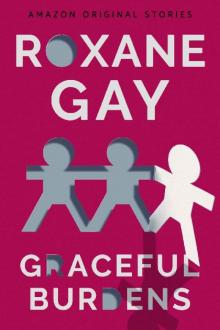 Graceful Burdens (Out of Line collection)
Graceful Burdens (Out of Line collection)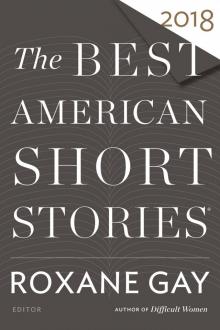 The Best American Short Stories 2018
The Best American Short Stories 2018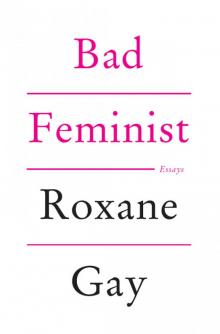 Bad Feminist
Bad Feminist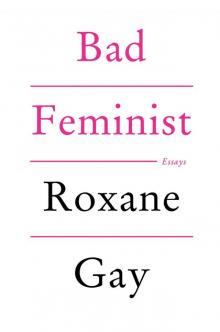 Bad Feminist: Essays
Bad Feminist: Essays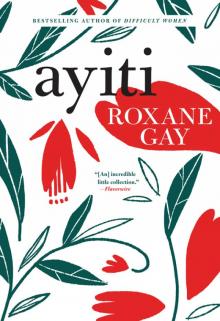 Ayiti
Ayiti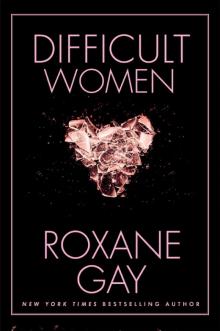 Difficult Women
Difficult Women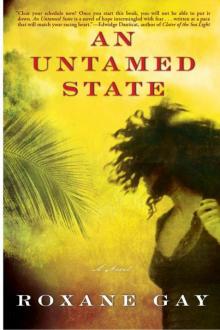 An Untamed State
An Untamed State Hunger
Hunger